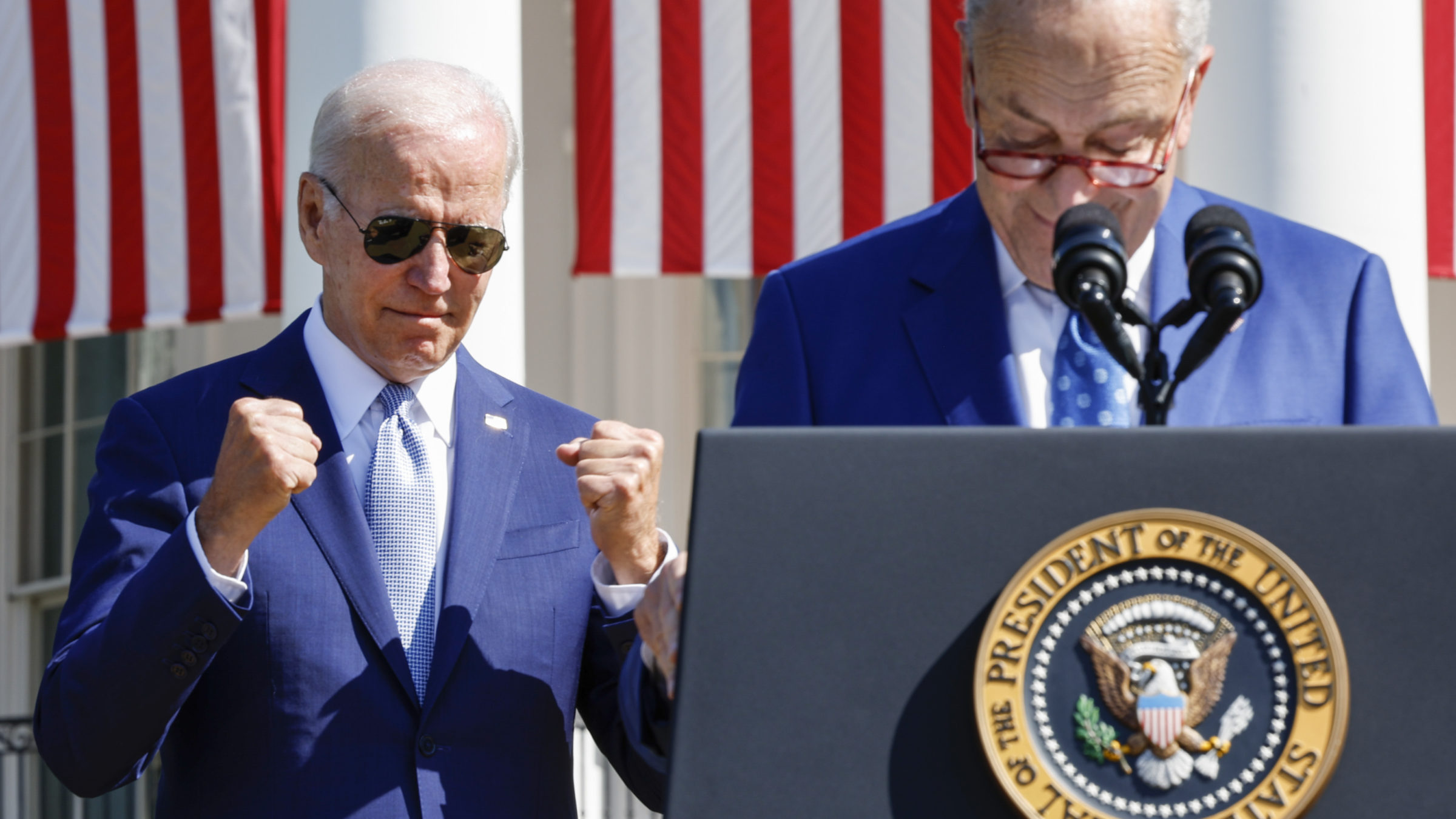The precise contours of the 118th Congress are still coming into focus, but the headlines, at least, seem good to go. In the Senate, Democrats will retain a narrow 50-member or 51-member majority, depending on the results of the runoff in Georgia between incumbent Raphael Warnock and pseudonymous Twilight fanfic author Herschel Walker, whose get-out-the-vote strategy is expected to lean heavily on his campaign’s ability to get all his secret kids to cast ballots on Election Day.
Republicans fared better in the House, which they’re expected to win, but by a single-digit margin that might charitably be described as “ungovernable.” Assuming Republicans elevate the current Minority Leader, Kevin McCarthy, to Speaker, he’ll have the unenviable task of babysitting a splintered caucus that depends on the cooperation of Freedom Caucus wingnuts who openly despise him. McCarthy’s margin also won’t be “safe” in any meaningful sense: Since 2020, 16 sitting members of Congress have resigned or died in office. In other words, if we are in for two years of the balance of power tipping every time Lauren Boebert holds a press conference or some backbench moron quits in the midst of a campaign finance scandal, the House looks primed to become an even less productive body than it already is.
In which case, the agenda for President Joe Biden and the Democratic-controlled Senate becomes a pretty simple one: Spend the next 26 months confirming as many cool lawyers to life-tenured federal judgeships as possible. Given that 2024 is both a presidential election year and a waking nightmare of a map for Senate Democrats, the party’s next chance to make its mark on the federal judiciary could be a long way off.

When it’s time to confirm some Article fuckin’ III judges, baby (Photo by Chip Somodevilla/Getty Images)
Over Biden’s first 22ish months in office, the Senate has confirmed 85 judges, matching the pace set by President Donald Trump and then-Majority Leader Mitch McConnell four years ago. This success goes beyond counting statistics, too: More than half of these judges are professionally diverse—basically, people who are not former prosecutors or law firm partners. Two-thirds are women, and two-thirds are people of color.
All of this is obviously good. But the denominator of the fraction matters, too: There are still 118 current and looming judicial vacancies, and to date, the White House has announced a nominee for only 56 of them. If you’re doing the math at home, this leaves 63 vacant judgeships without a nominee, four of which existed before Biden even took office.
As Chris Geidner, who publishes the Law Dork newsletter, explains over at MSNBC, much of the fault here lies with senators, who are traditionally responsible for recommending district court candidates to the White House. It’s no surprise that Republicans are finding things to do with their time other than helping the Biden administration fill these vacancies. But of the 63 vacancies without a nominee, 20 are in states with two Democratic senators. By my count, this is 20 too many. Two years in to Biden’s presidency, if you are a sitting Democratic senator, putting together a list of lawyers in your state who would make better judges than the transphobic bloggers and men’s rights activists whom President Charlie Kirk would nominate should not be too difficult a task.
Speaking of Senate Democrats needing to get their shit together: Filling these vacancies will also require getting rid of blue slips, an archaic Senate courtesy that effectively gives Republican senators a veto over home-state district court nominees. (As you read this sentence, Wisconsin senator and noted voter fraud crackpot Ron Johnson is withholding a blue slip for a nominee whom Johnson recommended to Biden in the first place.) Because the blue slip tradition is not a formal rule, leadership could abolish it at any time, and the fact that Judiciary Chair Dick Durbin is still honoring the wishes of Republicans who backed a violent coup attempt less than two years ago makes me want to walk into the ocean.
When Biden took office, his administration made a high-profile pledge to diversify the bench both politically and demographically. But this effort will be far less consequential if he only gets to implement that promise in the blue-state paths of least resistance. Control of the judiciary for the next several decades is simply too important to allow Ted Cruz a veto over anyone who hasn’t written a sufficiently fawning blurb for the dust jacket of his next book.
I understand that in a unified Democratic government, the Biden White House had to give its legislative agenda the proverbial college try: campaign promises to keep, a gigantic stimulus package to pass, landmark voting rights legislation to watch die a filibuster-induced death, and so on. But with a Republican-controlled House that’s about to make Lord of the Flies look like a handbook for good governance, I don’t expect Biden to have a ton of opportunities to sign groundbreaking, legacy-defining bills in the foreseeable future.

Attention Senate Democrats, please stop treating this man like a serious person (Photo by Scott Olson/Getty Images)
Retaining control of the levers of power responsible for judicial confirmations, however, means that this time need not go to waste. When the new Congress gavels in in January, I want two years of Democrats running absolutely roughshod over their feeble Republican counterparts on the Senate Judiciary Committee. I want Durbin to install mute buttons on every Republican’s microphone, and to deploy them with the freewheeling swagger of an overconfident Around The Horn guest host. I want Josh Hawley on Fox News every night, shout-sobbing about the latest set of civil rights lawyers to get pushed through on party-line votes. I want Ed Whelan to fritter away so many late nights squinting at pixelated floorplans of some public defender’s law school apartment that the Zillow logo burns itself into his computer monitor. From now until Inauguration Day 2025, judges should come first, fast, and nonstop.
My argument that Democrats should play something resembling hardball here is also my argument for why they should have abolished the filibuster and expanded the Supreme Court when they had the chance. If the shoe were on the other foot—if Republicans held the White House and the Senate, and federal courts were the most important source of Democratic power—I promise you that McConnell would do whatever was necessary to dilute it. We are only a few years removed from Republicans holding Antonin Scalia’s seat open because they could, and ending the filibuster to confirm Neil Gorsuch because they could, and ignoring credible allegations of sexual assault to confirm Brett Kavanaugh because they could, and then racing to confirm Amy Coney Barrett, looming election be damned, before their window of opportunity slammed shut. At this point, for Democrats, failing to respond in kind would be tantamount to unilateral disarmament.
Right now, the path for Senate Democrats to overhaul a judiciary dominated by white guys, cops, and/or Federalist Society dead-enders is as open as it’s ever going to be. They just have to summon the courage to take it.
As always, you can find us at ballsandstrikes.org, or follow us on Twitter @ballsstrikes, or get in touch via[email protected]. Thanks for reading.
This Week In Balls & Strikes
A Georgia Judge Is Extremely Fed Up With the Supreme Court’s Bullshit, Yvette Borja
The latest scathing of the Court’s legitimacy comes from within the judiciary.
How John Roberts Delivered the House to His Fellow Republicans, Elie Mystal
The most powerful GOP operative in Washington strikes again.
Clarence Thomas Remains Very Upset That “Criminals” Have “Civil Rights”, Yvette Borja
Guarantee this man is one of those freaks with a dozen true crime podcasts on his phone.
The Insular Cases Survive Because the American Legal System Keeps Them Safe, Peter Shamshiri
How anodyne legal process transforms explicit racism into the law of the land.
This Week In Other Stuff We Appreciated
The Only Way Senate Democrats Can Salvage the Courts Now, Mark Joseph Stern, Slate
Reviewing the latest round of unhinged Trump judge lower court decisions.
The Supreme Court’s Hands Are All Over the Midterm Election Results, Paul Blumenthal, HuffPo
The justices’ decisions in key voting rights cases might have been enough to tip the balance of power.
Virginia Thomas Doubled Down On Donations to Republican House Candidate (Who Ended Up Losing), Zach Everson, Forbes
Lol.
This Week In Obscure Photos of Supreme Court Justices On Getty Images


